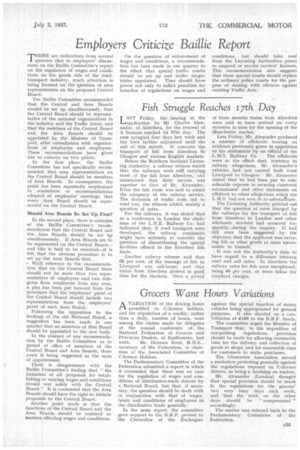Employers Criticize Baillie Report
Page 99

If you've noticed an error in this article please click here to report it so we can fix it.
THERE are indications from several quarters that in employers' discussions on the Baillie Committee's report on the regulation of wages and conditions on the goods side of the roadtransport industry, much attention is being focused on the question of area representation on the proposed Central Board.
The Baillie Committee recommended that the Central and Area Boards should be set up simultaneously, that the Central Board should be representative of the national organizations in the industry and the Traffic Areas, and that the members of the Central Board and the Area Boards should be appointed by the Minister of Transport, after consultation with organizations of employers and employees. These recommendations have given rise to concern on two points.
In the first place, the Baillie Committee has not specifically recoMmended that area representatives on the Central Board should be members of Area Boards. In consequence, the point has been repeatedly emphasized in resolutions or recommendations adopted at employers' meetings, that every Area Board should be represented on the Central Board.
Should Area Boards Be Set Up First?
In the second place, there is criticism of the Baillie Committee's recommendation that the Central Board and the Area Boards should be set up simultaneously. If Area Boards are to he represented on the Central Board—. and this is held to be essential—it is felt that the obvious procedure is to set up the Area Boards first.
With reference to the recommendation that on the Central .Board there should not be more than two representatives of employers and two delegates from employees from any area, a plea has been put forward from the provinces that the employers' panel of the Central Board should include two representatives from the employers' panel of each Area Board.
Following the opposition to the findings of the old National Board, a suggestion has been made in one quarter that no members of that Board should be appointed to the new body.
In the absence of any recommendation by the Baillie Committee as to period of office of members of the Central Board and Area Boards, three years is being suggested as the term of appointment.
There is disagreement with the Baillie Committee's finding that "the initiation of all proposals for establishing or varying wages and conditions should rest solely with the Central Board." It is contended that the Area Boards should have the right to initiate proposals to the Central Board. , Another point made is that the functions of the Central Board and the Area Boards should be confined to matters affecting wages and conditions.
On the question of enforcement of wages and conditions, a recommendation has been made in one quarter to the effect that special traffic courts should be set up and traffic magistrates appointed. They should have power not only to inflict penalties for breaches of regulations on wages and
conditions, but should take oyez from the Licensing Authorities powef to suspend or revoke carriers' licences. This recommendation also suggests that these special courts should replace the ordinary police courts for the purpose of dealing with offences against existing Traffic Acts.




















































































































































